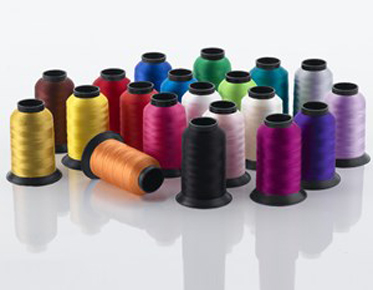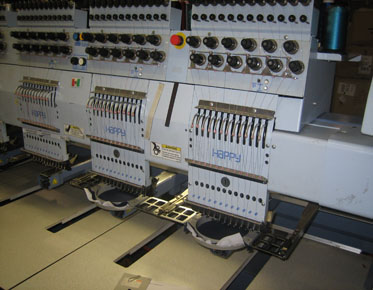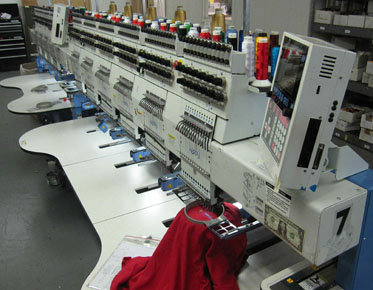Knowledge from Eagle digitizing: What's the Best Machine Embroidery Thread?
Machine embroidery is exciting but daunting for newbies. Beginners often overlook the importance of knowing the different types of machine embroidery thread and how to use them. You are here because you want to know more, become better, and improve your creative knowledge and abilities. You've come to the right place. We'll take a look at polyester, rayon, cotton, silk, and the slightly infamous metal thread, and when to apply them to your work,The following content also has some reference value for Eagledigitizing.
Before we dive into threads, we must understand that not all threads are the same, and not all computers are the same. Matching thread brands to machines and needles is like finding the perfect recipe. Certain thread types and brands will work better with certain machines and needles.
It's critical to test your thread first on a piece of fabric, not your partner's favorite shirt. Make sure the material to be tested is the same material used for the project. Start by ordering a small number of threads for proper testing to see what works best for your machine and creative intent.
Polyester embroidery thread
The polyester thread provides sheen and makes your embroidery look professional and feel professional. The line comes in a variety of colors and is known to run smoothly.
It is a great choice for general embroidery, especially outdoor clothing or children's clothing. We all know kids are mess-free little angels, but when they make a mess, polyester will stand up to the cleaning process.
The last thing any embroidery machine wants
is a thread that keeps breaking. Your machine will be happy when you use
polyester thread in your projects. However, polyester thread should not be used
in all projects. I will explain further below.
Rayon Embroidery Thread
Its only downside compared to polyester is its strength. The breaking point of polyester is much higher than that of rayon. That's why it's important to test different rayon thread brands with your machine to see how they hold up with stitch-intensive designs and high-speed stitching.
Generally, rayon threads still perform well during high-speed splicing. It is softer than polyester and better suited for intricate jobs or freestanding lace jobs
Cotton embroidery thread
Polyester and rayon boast a high-gloss finish, and cotton has a beautiful soft sheen. You can order cotton threads in a matte finish to further your creativity. It performs well in most machines, but again, it's best to test it to make sure it runs smoothly.
Cotton threads can be purchased in standard thicknesses, but they also come in very fine varieties for incredibly intricate and delicate work. Remember, the thinner the thread, the more likely it is to break when embroidering.
Silk embroidery thread
Silk is luxurious and sought after in the fashion world and is considered equally luxurious in machine embroidery. The thread is strong and delicate, but has a luster and softness that polyester and rayon cannot match.
For these reasons, silk thread can be
expensive, and it can be difficult to obtain a specific color. This is the
thread you want to use for high end projects or for embroidering on luxurious
fabrics.
Metal embroidery thread
Yes, the thread that keeps breaking. Metal threads are notorious for breaking during embroidery, which can cause frustration!
Metal thread offers beautiful color and sheen that other threads cannot imitate, but many new embroiderers are easily frustrated because rethreading an embroidery machine can be a very annoying and time-consuming process.
This can easily be fixed by making some adjustments to the spool technique and making sure to use needles specific to metal thread embroidery
The wire consists of a central core wrapped in metal or foil, which is then dyed with the desired color. These threads tend to fall apart easily, which is where thread integrity seems to fail. Picking up high-quality metal thread can reduce breakage when embroidering and is worth the extra penny.
In the field of machine embroidery, thread thickness is expressed by weight. The higher the number, the finer the thread and the easier it is to break. Thinner thread is good for heirloom quality embroidery, thicker thread is better for general work.
For example, the standard thickness of rayon thread is called a 40 heavyweight thread. The 20wt thread will be thicker and the 60wt thread will be thinner. When choosing a thread weight, it all depends on the desired result or purpose of the project.
For high-quality, high-detail designs on small surface areas, finer threads can be used. For larger designs, perhaps for materials that will be used outdoors or continuously, you may need thicker threads.
So what thread is the best machine embroidery thread?
If you're hungry for answers, it's
polyester. If you're hungry for the right answer, then you need any clues to
bring the embroidery integrity and creative genius it deserves to your project.
Polyester is an excellent all-rounder, but rayon is better for softer jobs. The
wire may break easily, but it will give your piece the extra flair it needs.
Silk is expensive, but it will add a luxurious look and feel to your projects.



